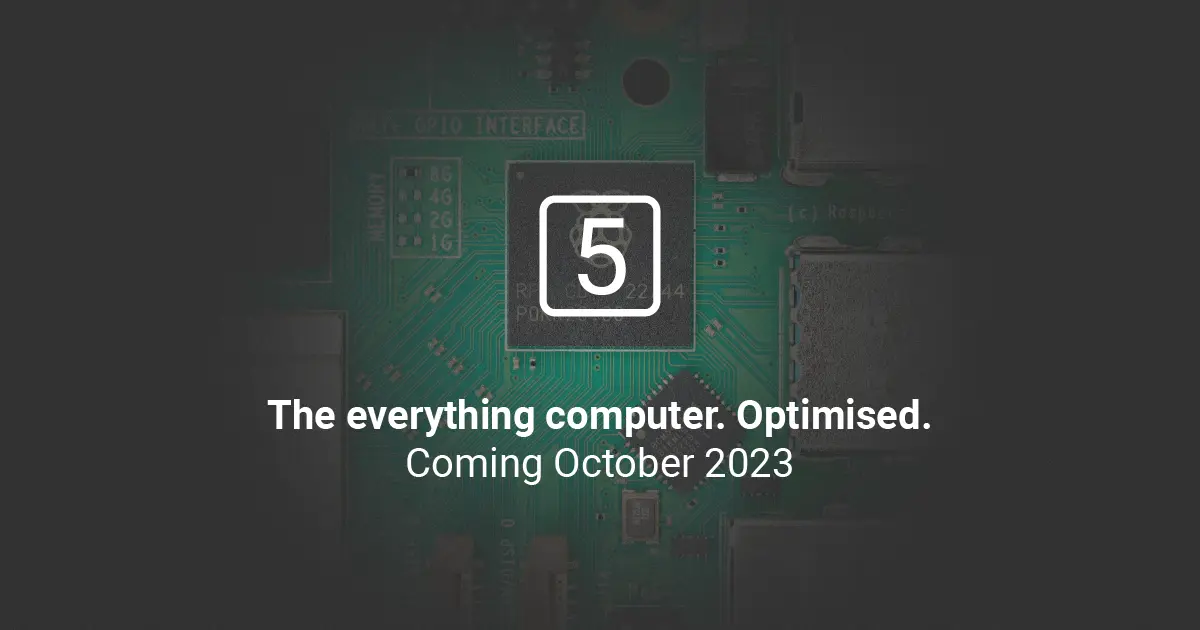- Broadcom BCM2712 2.4GHz quad-core 64-bit Arm Cortex-A76 CPU, with cryptography extensions, 512KB per-core L2 caches and a 2MB shared L3 cache
- VideoCore VII GPU, supporting OpenGL ES 3.1, Vulkan 1.2
- Dual 4Kp60 HDMI® display output with HDR support 4Kp60 HEVC decoder
- LPDDR4X-4267 SDRAM (4GB and 8GB SKUs available at launch)
- Dual-band 802.11ac Wi-Fi®
- Bluetooth 5.0 / Bluetooth Low Energy (BLE)
- microSD card slot, with support for high-speed SDR104 mode
- 2 × USB 3.0 ports, supporting simultaneous 5Gbps operation
- 2 × USB 2.0 ports
- Gigabit Ethernet, with PoE+ support (requires separate PoE+ HAT)
- 2 × 4-lane MIPI camera/display transceivers
- PCIe 2.0 x1 interface for fast peripherals (requires separate M.2 HAT or other adapter)
- 5V/5A DC power via USB-C, with Power Delivery support
- Raspberry Pi standard 40-pin header
- Real-time clock (RTC), powered from external battery
- Power button
I’ve got to wonder, am I the only one that wishes these things came with PoE support out of the box without needing an addon? I can’t even find a competitor that supports PoE without needing an extra PoE HAT.
Tbh, POE isn’t a feature most people need. And it’s quite expensive, takes up a lot of room, and generates quite a bit of heat.
You can get inline POE extractors that spit out 5v usb/jack or 12 jack. I use them quite a lot, and they are much cheaper than PoE hatsYeah I just hate all the extra clutter the extractor adds. It’s really nice to just run some cat 6 to a Pi and call it a day. If I could spend an extra $50 to get a Pi or Pi-like device that came with PoE built in I would in a heartbeat.
I know what you mean.
The problem is, actual POE powered computers end up being commercial display drivers or embedded/industrial systems. And that means a significant increase in price.These devices are often plugged into things that require power. At which point, you can just power it locally. So the added cost and complication of POE isn’t worth it.
Chances are, a lot of the things you are trying to do don’t need a full SBC and Linux. But I don’t know your situation.
Something like this: https://www.dfrobot.com/product-1286.html
Or this.
https://www.robotpark.com/Arduino-Ethernet-Microcontroller-With-PoE-Power-over-Ethernet-V3If it’s something like a screen/touchscreen interface, theres already power there…
But you could use an android TV, there are some that are POE powered, but most displays have a power source these days.Things like Bluetooth or whatever, you can probably get off-the-shelf extenders or repeaters.
I’d love it if it was more common, gives an easy way to remotely power cycle devices. But the ridiculous extra cost that PoE enabled general purpose devices come with just isn’t worth it for me.
Right now the main things I’m using it for is running PiHole and home-assistant, although there’s a few other network services I’d like to run on a couple Pi’s. So yeah, I can’t really use embedded devices for that. I could use something like a NUC, but that’s adding significant cost at that point, easily into the $200+ range, where I’m trying to keep it below $150. All my switches already provide PoE, and I need to run ethernet to the device anyway for network connectivity, so adding new PoE devices is literally just a single cable. If I’m powering them a more traditional way I’ve got to deal with a power brick and finding space in an already crowded UPS, or finding someplace to tack up a PoE extractor in a crowded shelf.
PoE runs on 48V, it’s nontrivial to get that down to levels usable by a microprocessor.
It’s not free, but it’s not really that hard either. You can even get fancy and use isolated power for some extra safety.
I’d like to see some more specialized versions of these boards. For instance one that trades the MIPI ports (which I have literally never found a use for) for PoE or some other feature that’s more useful in a networking centric use case. In many cases I’d even be willing to give up a USB port for that.
Yeah well, that’s like the whole area for the USB and Ethernet plugs taken up. You also definitely want an isolated one for a device that’s supposed to be used by end users.
It’s really not, you have a buck reg on board already, it’s just the peripherals that need 5v and for a lot of that you can use linear regs.
Yeah there’s a buck regulator on board, but the caps for it are far too tiny for 48V. The ones you need are much bigger.
Not… really. Remember the voltage rating increases but the capacitance itself can reduce so the dielectric just increases in size but shrinks in layers. Same energy, but since it’s cv^2 you can actually reduce capacitance more.
You’re talking about the bulk input tanks which need to be 100v, the rest of them past the inductor should be the same.
All thus being said, nobody will do this, not for a good reason, the guys who do power circuits think differently than the guys who do logic and their state space equations say it’s not safe, which would be true for reactive loads but for this kind of logic it’s mostly resistive with some obnoxious parasitic inductance and nasty switching noise that the supply caps would filter.
This is changing with the younger generation who don’t have those prejudices.
Olimex had a ARM board with POE, if I remember correctly… though I cannot find it atm. Here’s an ESP based instead: https://www.olimex.com/Products/IoT/ESP32/ESP32-POE/open-source-hardware
Looking forward to finding one in a store right around the time the RPi 6 is released.
Haven’t had trouble finding one in quite some time.
I didn’t think they were that hard to find at the moment, I saw 5 or 6 CanaKits in Best Buy last week.
The 4?
Yeah, the Pi 4 seems to be the only model Best Buy stocks.
Is that a bad thing? I’m brand new to the RPi world (as in, I just discovered I may want one two days ago) so I’m not sure if one model is better for certain things or are they just incrementally improved from one generation to the next. I am not tech savvy so I couldn’t answer that by looking at specs.
Pretty much just incremental improvements. Faster processor, more RAM, slightly better peripherals (like faster ethernet or newer wifi specs), but essentially they’re all the same thing.
Thank you for the info!
It’s not bad, just more expensive and more powerful, so it would be overkill for certain projects. If you want a cheaper or smaller (but less powerful) option, you’d have to get it from somewhere else.
If you want to use it for emulating games for example, you’d probably want the best performance you can get. If you’re just making a digital picture frame though, you don’t need to spend the extra money for a Pi 4 and can get away with the cheaper models.
I’d recommend looking up what you want to do and seeing what model Pi other people have used. I use a Pi 3 to control my 3D printer, which isn’t too demanding of a task for it.
I guess that makes sense. I’m looking to set up a jellyfin server for myself and a few friends so I think I’ll need a bit more performance but I’m sure I can do that with older models as long as they’re equipped with the 8g of ram.
Thanks for the response!
It simply may be overkill for some projects. No reason to get a 4 when a 3b or pico will do the job just fine at a fraction of the cost. Same deal with the 5; It’s more powerful, but it’s also more expensive and not every project needs the most recent version. The original goal of the Pi was to provide cheap accessible processing for whatever you may need. But as innovations keep happening, things keep getting more expensive.
For an extreme example, you wouldn’t build a $3500 gaming PC for your grandparents who will only use it for Solitaire and checking their email.
Depends. Most of my Pi’s are 3 or under, and they’re doing mundane tasks like printserver or VPN. This takes little power or speed. I did use a pi B+ with Kodi and that tended to choke up occasionally, I think mostly due to heat though even after applying heat sinks. The 4 and 5 should handle that job a lot better.
I preordered on DigiKey.
Man I just want to actually be able to buy a Pi 4 at non-scalper rates.
Theres a bunch available in the US/Canadathis week (all week, for the first time in a very long time). Not available everywhere, but the major Pi distributors have pretty much all had some - all the pi 4 models, too.
The drought has been easing up for a while and has been nearly over in Europe for several months. It looks like it may just about be over in NA too.
If you’re in other countries I guess maybe it’s still pretty dry.
Should be soon since the scalpers will be moving on to the 5’s.
Out of context, “a power button” is really funny to see advertised as a feature.
deleted by creator
Wake me up when I can get one for MSRP.
Hopefully they can address the stock issues but I’m not holding my breath. Would’ve also liked to see full-sized HDMI.
Was the 4 difficult to obtain when it was released? Cause the vendor I’m looking at (digi-key) claims to have about 5,000 in stock right now.
The 4 was impossible to find until, like, four months ago. I’ve been subscribed to six stock notification services for three years and only got my hands on a Pi 4 this year (and it’s not even the model I wanted!). The pandemic was nuts, but things seem to have stabilised.
No actual PCIe or M.2 connector on the board, the M.2 hat won’t be available at launch, and it appears to block the required(?) coolers from being fitted.
deleted by creator
I still have a bad taste in my mouth from the Pine64 I bought from their Kickstarter. The thing lasted 4 months before it stopped booting. I have no faith in any subsequent products.
deleted by creator
There were reports that many of the original Pine64 Kickstarter boards had this bootloop problem. While I understand this was one of there first products, I still don’t want to sink money into something when better and more stable options are available.
deleted by creator
If that’s true then they fixed any quality issues on subsequent boards, so you questioning the stability and quality of the current boards is no longer substantiated
Meanwhile, anyone that supported their Kickstarter got screwed.
but I’m curious what you would consider a more stable option?
Why would I bother when you’re obviously just going to pick it apart, just like you did with the Pi immediately after asking that question. You like the Pine64, great. Good luck with that. I won’t touch them with a 10 foot pole. That’s my opinion. Have a nice day.
deleted by creator
Not required. And it might block the OFFICIAL cooling case, but it’s a Raspberry Pi. There will be a hundred different custom cooling options soon.
The problem is that the M.2 thing still is a HAT, and basically sits about 10mm above the main board, leaving no room for proper active or passive cooling - or at least making it very complicated to achieve. Putting the M.2 slot at the bottom of the main board would have been a good solution that would have avoided a lot of problems.
I still can’t get over the tower cooler available for the Pi 4.
It’s completely unnecessary and I love it
I think I’ve personally hit the point where PIs are like phones, there’s nothing new that I actually need but a handful of things that looks handy. Never thought I’d be excited about (effectively) a bios battery.
deleted by creator
Flawless victory! 🙌
This thing will make a blazing fast encrypted ZFS NAS with the 2 full-speed USB 3 ports and crypto extensions.
I don’t think Linux supports ZFS on ARM. It’s a bad idea without ECC RAM anyways.
It does and I used to briefly run a ZFS pool on a Pi 4 in 2019. I only abandoned it due to a nasty deadlock bug that I think got resolved sometime ago. Non-ECC RAM shouldn’t be significantly worse than using say MDRAID or Btrfs with non-ECC RAM.
Too bad you’ll never get one because we’re only making 20 of them!
They’re commuting to servicing them til 2035 so I’m sure there will be a time when you can grab one.
In 2034
Just in time when I was reading about Home Assistant. Either I can get a couple of these to play with, or I just find an older Pi 4 for cheaper (and easier availability).
FYI, my Pi4 has more than enough cpu and memory to run Home Assistant with a couple hundred devices.
Sounds good, maybe I can start with the Pi 4 then!
Home Assistant OS won’t support this board immediately, though I’d expect a beta to arrive sooner rather than later.
deleted by creator















